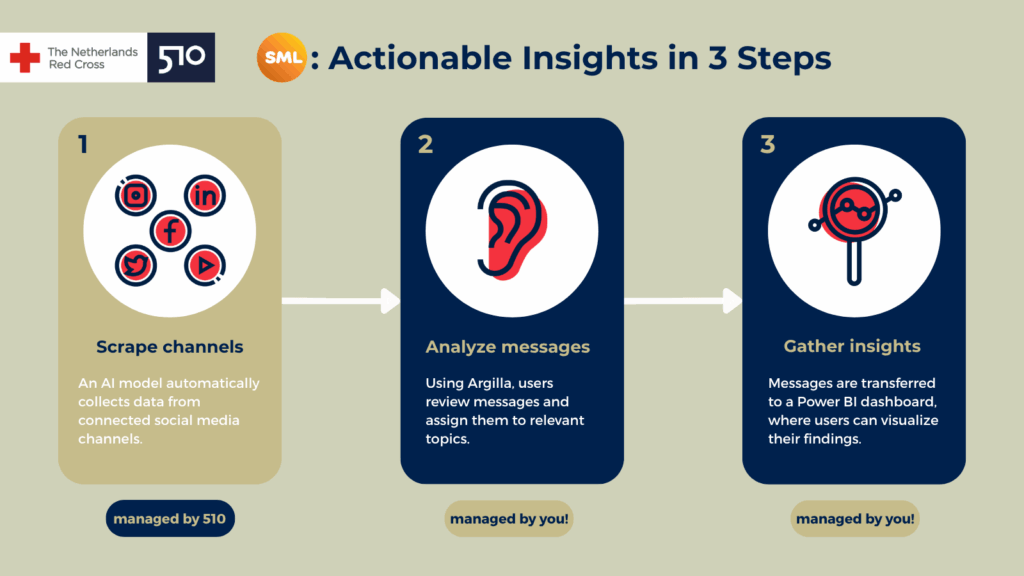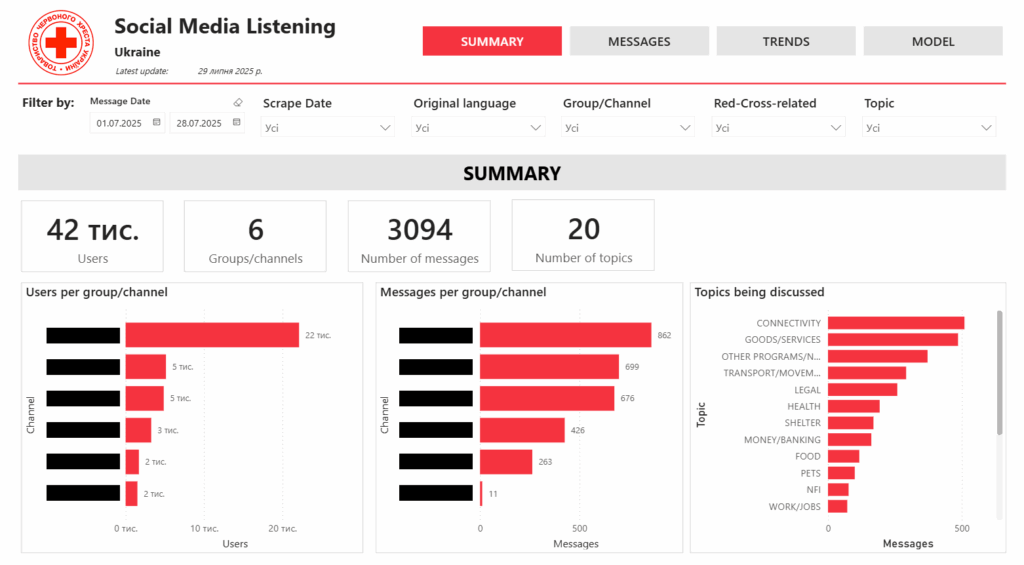Humanitarian action thrives when it’s guided by community voices. Amid the humanitarian crisis in Ukraine, the Ukrainian Red Cross Society intended to gain an unbiased understanding of the needs, feedback and sentiments of people affected, and be able to target activities to the needs identified. Together with the Netherlands Red Cross’ data and digital team, 510, the National Society decided to pilot the Social Media Listening (SML) tool, which they can now operate and maintain autonomously – driving local ownership. This initiative, alongside other activities, is funded by the International Federation of Red Cross and Red Crescent Societies (الاتحاد الدولي لجمعيات الصليب الأحمر والهلال الأحمر)’s emergency appeal to support the regional response in Ukraine and impacted countries.
How SML works
Using SML, National Societies pull data from instant messaging platforms to learn what those impacted by disasters or crises are expressing about their situation, needs, and interactions with those providing assistance. By combining quantitative and qualitative data, users can identify key insights and trends from these conversations. This analysis helps mitigate risks, improves internal reporting, and enables National Societies to implement, and refine activities, programmes, and information campaigns. SML follows a simple 3-step workflow:

An AI model scrapes and translates thousands of messages posted from instant messaging platforms, removing personally identifiable information from the messages and classifying them among relevant topics (1). These messages are then read in Argilla (a collaborative tool to build datasets), in which the message topics are validated by expert analysts (2). This expert input is used iteratively to improve the AI model and thus provide ever-better insights to users. The insights are finally visualized in a Power BI dashboard, where users can see prominent message clusters sorted by topics, such as shelter, food, or health (3). Only the AI model is managed and hosted by 510, whereas the other steps can be entirely carried out by the National Society using SML. This workflow reflects 510’s human-centred design approach: intuitive tools, local language support, and user-friendly interfaces.
“The use of SML has shown that collecting feedback on social media can be effective and informative. Provided that the tool’s sources are optimized, it can significantly improve the understanding of needs and feedback in communities and enhance the overall quality of reporting.”
Bohdan Koval, Feedback Analysis Specialist at the Ukrainian Red Cross Society

From service to self‑reliance
When the Ukrainian Red Cross Society initially started using SML, the 510 team scraped and analysed Telegram channels, delivering monthly insights to local teams. This was useful, but not sustainable. To transfer ownership and build capacity, the National Society decided to transition from being a service recipient to operating the tool autonomously. As a result of this transition and extensive training by the 510 team, Ukrainian Red Cross Society staff can now use Argilla and Power BI to explore trends directly. All training materials were designed for non-technical participants and provided practical, hands-on experience towards building a feedback loop. The National Society no longer has to wait on external reports and can expedite insights on its own, enabling assistance with impact.
“I believe that SML can become a powerful tool for understanding the needs and context among the population, providing deeper insights into processes and sentiments. This, in turn, will help improve the overall quality of both reporting and response.”
Mariia Nazarko, Head of the Information Centre at the Ukrainian Red Cross Society
Tangible impact, local ownership
The shift from dependency to autonomy has translated into a much quicker identification of emerging needs, shaping the Ukrainian Red Cross Society’s response in a way that reaches communities. Between January 2024 and July 2025, over 83,000 messages have been scraped across six Telegram groups in a data-sensitive manner to avoid unnecessary exposure. Moving forward, the National Society will build on this successful pilot by continuing use of the tool following a tailored approach. This initiative demonstrates how digital innovation – when co-designed, responsibly built, and locally scaled – can empower National Societies to direct their own activities.
“SML has helped us understand some of the practical issues, concerns, and information gaps people displaced from Ukraine have been facing. Recognising people’s concerns and how those changed over time gave National Societies the opportunity to adapt their work to better meet people’s evolving needs.”
Mark South, CEA Consultant, Europe region at IFRC
Ready to listen smarter? 👂
A data science background is not necessary to listen at scale. The Ukraine pilot of SML proves that user-friendly tools and the right support are enough to turn insight into impact. Are you curious about using social media insights to inform your response, and looking for a low-maintenance solution your team can own? We’d love to hear from you. Let’s explore how we can make SML work for your context, together!
تنصل: يرجى ملاحظة أن النسخ العربية والفرنسية والإسبانية من هذه المقالة تم إنشاؤها تلقائيًا باستخدام الذكاء الاصطناعي. لا يمكننا ضمان الدقة الكاملة لهذه النسخ.
نريد أن نسمع منك!
Are you interested in implementing a similar solution with your National Society or humanitarian organization? Please reach out to:
Product Manager, SML: إيرا باديال ibadyal@redcross.nl